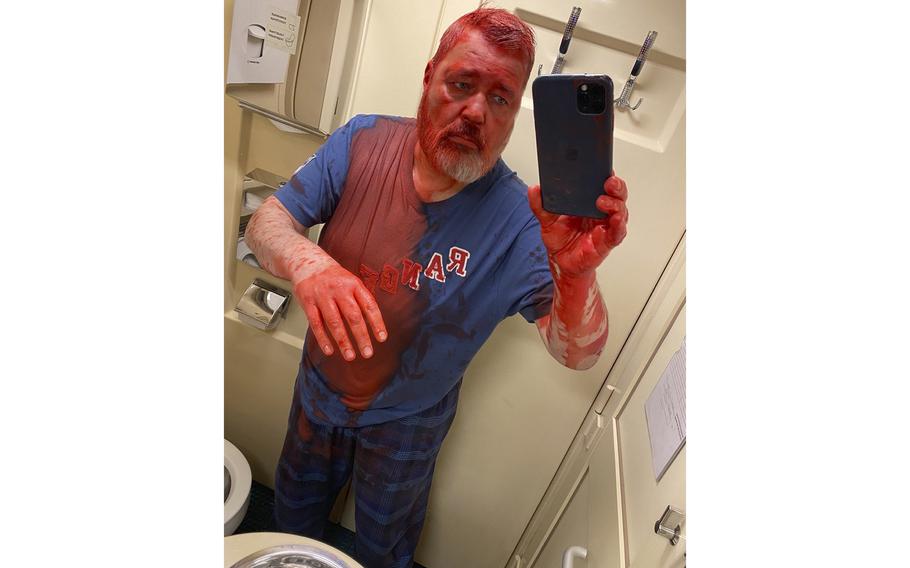
Nobel Peace Prize-winning newspaper editor Dmitry Muratov takes a selfie after he said he was attacked on a Russian train by an assailant who poured red paint on him, causing his eyes to burn severely, Russia, Thursday, April 7, 2022. (Novaya Gazeta Europe’s Telegram channel )
Prominent Russian newspaper editor Dmitry Muratov was attacked on a train Thursday, doused with a paint and acetone mixture that left his eyes burning, his newspaper said.
The attack came just days after Muratov, a winner of the Nobel Peace Prize, was forced to suspend operations of the independent Novaya Gazeta newspaper until the end of Russia's war with Ukraine.
"They poured oil paint with acetone in the compartment. My eyes are burning terribly," Muratov said in a brief report issued late Thursday by his newspaper.
The editor, who was on a train from Moscow to Samara, said the unknown assailant shouted, "Muratov, here's one for our boys," as he threw the paint.
"Oil smell all over the carriage," Muratov said in the report, which included photos of the mess.
Later, a Novaya Gazeta spokeswoman said that Muratov was in "satisfactory" condition and that he did not need to go to the hospital. "He carried on with his train journey," she said. Muratov ran after the attacker and managed to take his picture, and the police came to gather information, the spokeswoman said.
The 60-year-old dean of Russian journalism spent decades leading Novaya Gazeta, which became known for its pathbreaking investigative coverage.
In recent weeks, new censorship laws in Russia prompted many journalists to flee the country out of concern they could be arrested for reporting basic facts about Russia's invasion of Ukraine. Muratov stayed and continued publishing Novaya Gazeta until March 28, when the paper said it was suspending publication because it had received a second warning from Russian communication regulator Roskomnadzor.
"Two warnings from Roskomnadzor in a year risks a revocation of our media license," the paper said.
The attack comes as other prominent journalists and public figures - particularly those critical of Russia's invasion - also face abuse. A pile of animal excrement was recently left outside the door of St. Petersburg activist Daria Kheikinen, and a severed pig's head and an antisemitic slogan were placed at the door of Alexei Venediktov, editor in chief of the now-disbanded liberal radio station Echo of Moscow. The station was forced to close last month by state-owned Gazprom, which controlled its board.
Other activists and journalists have had the word "traitor" painted on their front doors in recent weeks, along with the letter "Z," which has become a symbol signifying support for the Kremlin's invasion of Ukraine.
When the invasion began, Novaya Gazeta carried on with its usual independent coverage. "Russia Is Bombing Ukraine" ran in huge letters across the front of the next issue of the newspaper, which printed stories side-by-side in Russian and Ukrainian.
"We do not recognize Ukraine as an enemy or Ukrainian as the language of an enemy," Muratov said in his video at the time. "And we never will."
But a week later, Russia adopted a law that threatened up to 15 years in prison for publishing what Russia calls "fake" news about the country's military. Among other things, the censorship means Russian media can't call the war a war - only a "special military operation."
Novaya Gazeta continued publishing, making it clear to its readers that it was forced to censor its reports. It steered clear of the word "war," sometimes using the marking <. . .> instead.
It continued publishing important work, including a story on civilian deaths in the Ukrainian city of Mykolaiv by special correspondent Elena Kostyuchenko, who visited the morgue and found the bodies of two sisters, a 17-year-old and a 3-year-old, piled together in the refrigerator.
Photos of the bodies ran with the story. In an accompanying video, Kostyuchenko said on camera: "I personally saw these bodies."
Other prominent Russians have been attacked with paint, including opposition politician Alexei Navalny, who was doused twice with dye in 2017. Navalny later suffered a near-lethal poisoning with a military-grade nerve agent called Novichok that he and two independent U.N. rights experts blamed on the Russian state. Russia has denied responsibility for the attack.
Muratov and fellow editor Maria Ressa of the Philippines were co-winners of the Nobel Peace Prize last year, for their work amid authoritarian pressures in their countries.